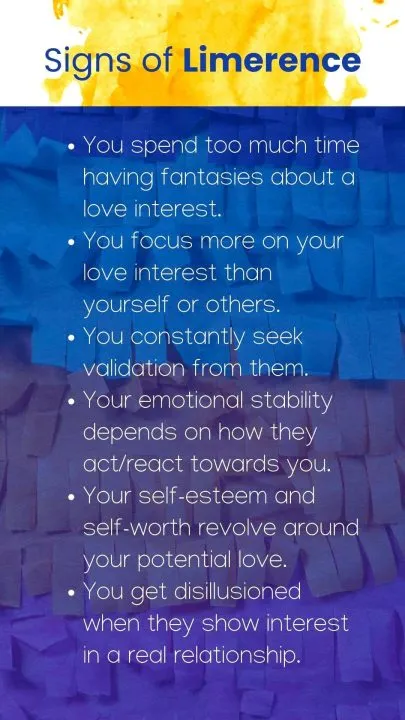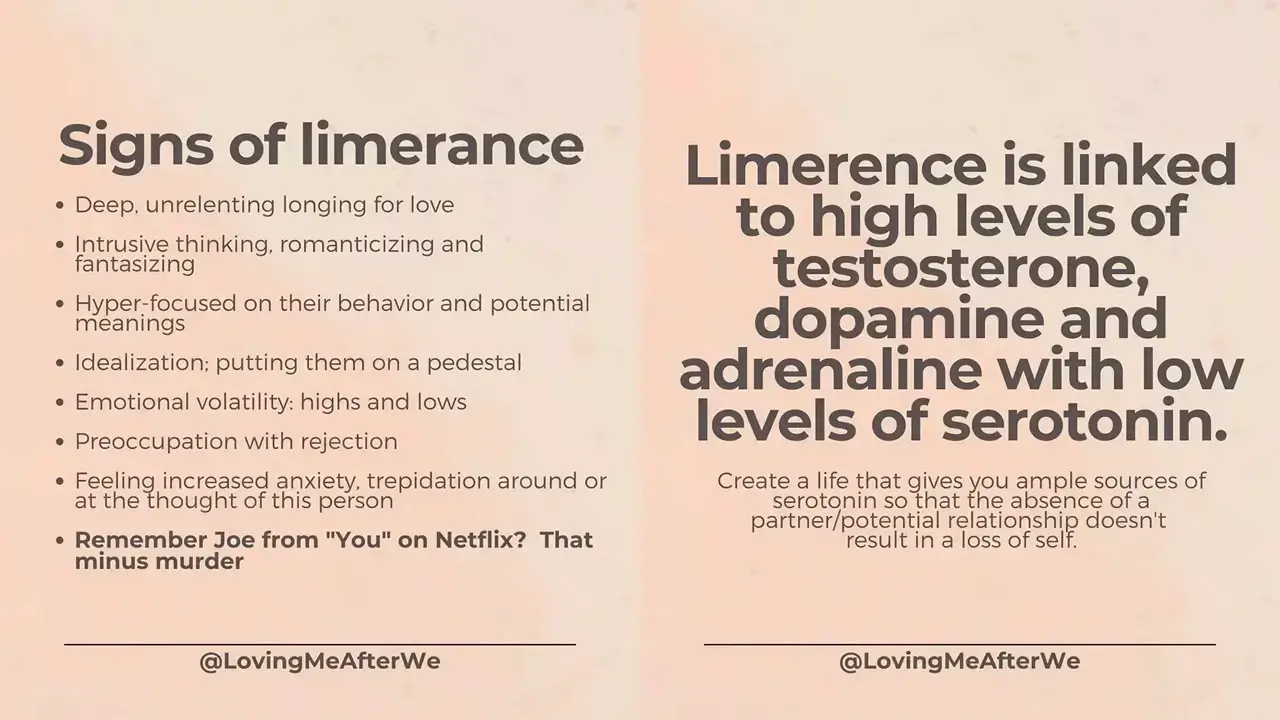Today's Sunday • 9 mins read
— By Dr. Sandip Roy.
You may not be familiar with the term “limerence,” but you may have lived it.
Limerence feels a lot like a crush, infatuation, love-sickness, or even early-stage love, but it’s not love.
Only those who go through it understand this force of nature.
How can you tell if you are in love or in limerence? And what could have caused it, and how can you get out of it?
What Is Limerence
Limerence is a mental state of intense romantic desire for a particular person.
It starts as an attraction, quickly becoming an obsessive craving for a relationship. However, the intense feelings are usually not reciprocated, and limerence remains unrequited.
- Limerent (LE) — the individual experiencing limerence
- Limerence object (LO) — the person of interest
Psychologist Dorothy Tennov coined and presented the term “limerence” in her book Love and Limerence: The Experience of Being in Love. She described it as “an involuntary, overwhelming longing for another person’s attention and positive regard.”
Most limerence is romantic, but it can also be non-romantic (like Celebrity Limerence — an obsession with famous people).
Nature of Limerence
- Limerence often blurs the lines between devotion and obsession, seeing the person of interest as perfect and ideal.
- The goal of limerence is a kind of merging, a “oneness” with the love interest, finalized as an ecstatic bliss of mutual reciprocation.
- The limerent person cannot accept that their object of fascination is not interested in them, despite their obvious or subtle signs.
- Emotions of limerence can swing between extremes — exhilaration and exhaustion, excitement and anxiety, elation and shame.
- The one-sided desires are so strong that the limerent person can neglect their normal daily duties in their personal and professional lives.
- The limerent person tries to hide his/her interest in their LO while seeking to interpret potential signs of emotional reciprocation (Tennov, 1979).
- Limerence can strike unexpectedly, linger for an indefinite amount of time, and then fade out, with the person returning to their normal behavior.
- When limerence ends, it might leave some emotional damage. Some habitual limerents may find a new person of fascination, starting a new cycle of limerence.
Signs of Limerence
- Obsessive thoughts and preoccupation: They are consumed with thoughts about their limerence object (LO). Constant preoccupation with imagined love scenarios can make it hard to concentrate on other aspects of life. Overthinking can lead to mental fatigue.
- Idealization and the halo effect: They see their love interest as flawless and ideal. This is due to a “halo effect” which creates an unrealistic positive bias towards their crush.
- Fantasy and fond hopes: They create elaborate fantasies about a life with the person of interest. In their daydreams, their love interest sees them as one they cannot live without, and as the only one who can make them happy.
- Self-isolating behavior: The limerent person not just tries to hide their interest in their LO, but also hide their emotions from friends and family. This often leads to self-imposed isolation.
- Bizarre rituals: Planning and rehearsing what to say, how to act. Driving by their love interest’s home, hoping to catch their glimpse. Attending events or joining clubs their LO is a part of, even if there is no genuine interest in the activity itself.
- Stalking behavior: One dangerous red flag of limerence is stalking. They may constantly monitor the limerent object’s online activity — checking their social profiles many times a day, or analyzing their posts and comments for hidden meanings. Or even follow them offline.
- Jealousy and possessiveness: The limerent sees their love object as personal property, feeling strong jealousy towards people trying to get close to their love object. This could lead to enmity with other admirers of that person. All along, the fear of rejection can intensify their possessiveness.
- Psychological pain: Limerence, by its very nature, is unrequited love. The constant one-sided pining may cause severe emotional distress, mood swings, loss of self-worth, persistent feelings of sadness or hopelessness, anxiety, and depression.
- Physical symptoms: Headaches, chest pains, stomach pain, or body aches, and physical exhaustion.

Why Limerence Feels Like OCD or Addiction
Limerence has been compared to OCD (Obsessive-Compulsive Disorder) and substance use disorder because it shares certain features with both, such as:
- Preoccupation: Like individuals with OCD who can’t stop thinking about their obsessions, people experiencing limerence often can’t stop thinking about the person they are infatuated with.
- Intrusive thoughts: Both OCD and limerence involve unwanted, intrusive thoughts that can be difficult to ignore. In the case of limerence, these thoughts are often centered on the desired person and can include fantasies or worries about the relationship.
- Loss of control: Both OCD and limerence can make individuals feel like they have lost control over their thoughts and behaviors. This loss of control can be distressing and can interfere with daily life.
- Compulsive behaviors: Both OCD and limerence can lead to compulsive behaviors. In OCD, these behaviors are often ritualistic and aimed at reducing anxiety. In limerence, compulsive behaviors might include constantly checking for messages from the desired person or seeking out ways to be near them.
- Withdrawal: Similar to substance use disorder, limerence can also involve withdrawal symptoms when the desired person is not present or when the relationship ends. These symptoms can include depression, anxiety, and difficulty focusing.
- Self-harm: In extreme cases, the limerent may engage in self-harm or destructive behaviors, such as substance abuse or disordered eating, as a way to cope with the emotional pain of limerence.
Causes of Limerence
Limerence is mostly idiopathic, meaning there is no underlying cause in most cases.
That said, some mental health conditions have been linked with limerence:
- Obsessive Compulsive Disorder (OCD; Wakin & Vo, 2008)
- Post Traumatic Stress Disorder (PTSD) (Willmott & Bentley, 2012),
- Excessive rumination (Curci, Lanciano, Soleti, & Rime, 2013; Horowitz, 1986).
- Aspects of anxiety and depression, as well as addiction (Sack, 2012; Wakin & Vo, 2008; Willmott & Bentley, 2012).

How To Deal with Limerence
The harsh truth is that many mental health clinicians are largely unaware of the concept of limerence.
1. Be Gentle On Yourself
Limerence can be overwhelming and disorienting. When it happens, it can throw your everyday routine into chaos.
Be gentle with yourself as you go through the experience. Practice self-compassion.
Do not judge or punish yourself for having strong emotions towards that one person.
Remind yourself of the impermanent nature of limerence. If you give it
2. Ground Yourself In Reality And Facts
Remind yourself that you are not experiencing genuine love or admiration, but a crystallized mix of attraction, desire, and obsession.
- Accept the facts: You can’t have the person the way you want. They don’t need you.
- De-fantasize yourself. Realize how you have unrealistic views and expectations of them.
- Take a step back if you know that they are already in fulfilling relationships and priorities.
- Be aware of your stalking behavior — they may call the police on you instead of welcoming you if you get too close for their comfort.
2. Slow Down And Don’t Rush Into Decisions
Your emotions are valid; the crux is keeping your emotion-driven behaviors under control.
Don’t rush into decisions under the influence of limerence:
- Remain patient instead of making impulsive choices.
- Check yourself before making “life-changing” or “bold” decisions.
- Give yourself time to doubt your feelings and evaluate your options.
- Wait until your limerence has somewhat faded before rooting for your “emotional rights.”
3. Share Your Feelings With A Trustworthy Person
Talking to a trusted confidante about your situation can help you handle your emotions.
- Seek help from your good friends and supportive family members to be your sounding board.
- Tell them you need an outside perspective on your chaotic feelings and thoughts.
- Listen to them non-judgmentally, if they point out what you are doing wrong.
- Ask their opinion if your feelings and cravings are irrational.
4. Seek Professional Help: Treatment of Limerence
Psychologists and therapists can help people with limerence by teaching them how to overcome the negative effects, develop healthy emotional bonding strategies, and improve their relationships.
There are not many clinical descriptions of limerence outside of Tennov’s book and Willmott and Bentley’s work “Exploring the Lived-Experience of Limerence: A Journey toward Authenticity” (2015).
- There are no diagnostic criteria or treatment protocols for limerence. Clinicians can use evidence-based treatment for Obsessive-Compulsive Disorder (OCD),
- Exposure and Response Prevention (ERP) is a promising first-line treatment for limerence. Cognitive restructuring and behavioral activation can also be helpful in its treatment.
- ERP is a cognitive-behavioral therapy that involves gradually exposing the person to the feared stimuli while preventing them from engaging in compulsive behavior. The person realizes their feared stimuli are not dangerous. And learns to tolerate the anxiety that comes with exposure.
Unhealthy Consequences of Limerence
- A major cause of relationship and family breakdown, as well as being related to anti-social behaviors, including stalking and self-harm (Tennov, 2005).
- Rejection can cause the limerent person to develop a hypersensitive personality (HSP). Even the normal, daily rejections may cause them to react over-emotionally.
- At its dangerous peak, limerence can make one stalk or kidnap their love interest, or even hurt them for not reciprocating love.
Final Words
Limerence is unrealistic love. Actually, it is not what love should be like.
So, do not let an experience with limerence change what it means to have healthy relationships.
√ Also Read:
- 4 Stages of Limerence — crush, infatuation, frustration, and resignation.
- Limerence and Midlife Crisis: Understanding the Connection
- 6 Common Limerence Triggers You Should Be Aware Of
- Here Are 10 Signs That Your Limerence Is Ending
- Summary of Tennov’s Book: Love and Limerence
√ Please spread the word if you found this helpful.
» You deserve happiness! Choosing therapy could be your best decision.
...
• Disclosure: Buying via our links earns us a small commission.
